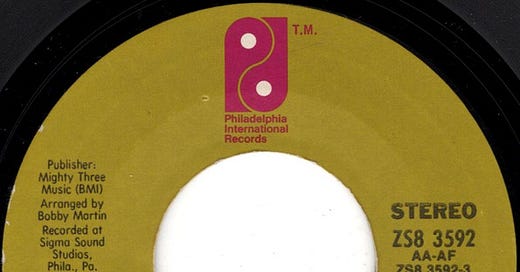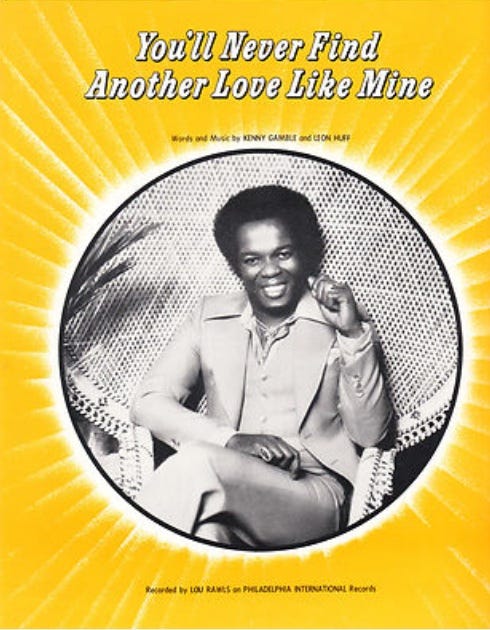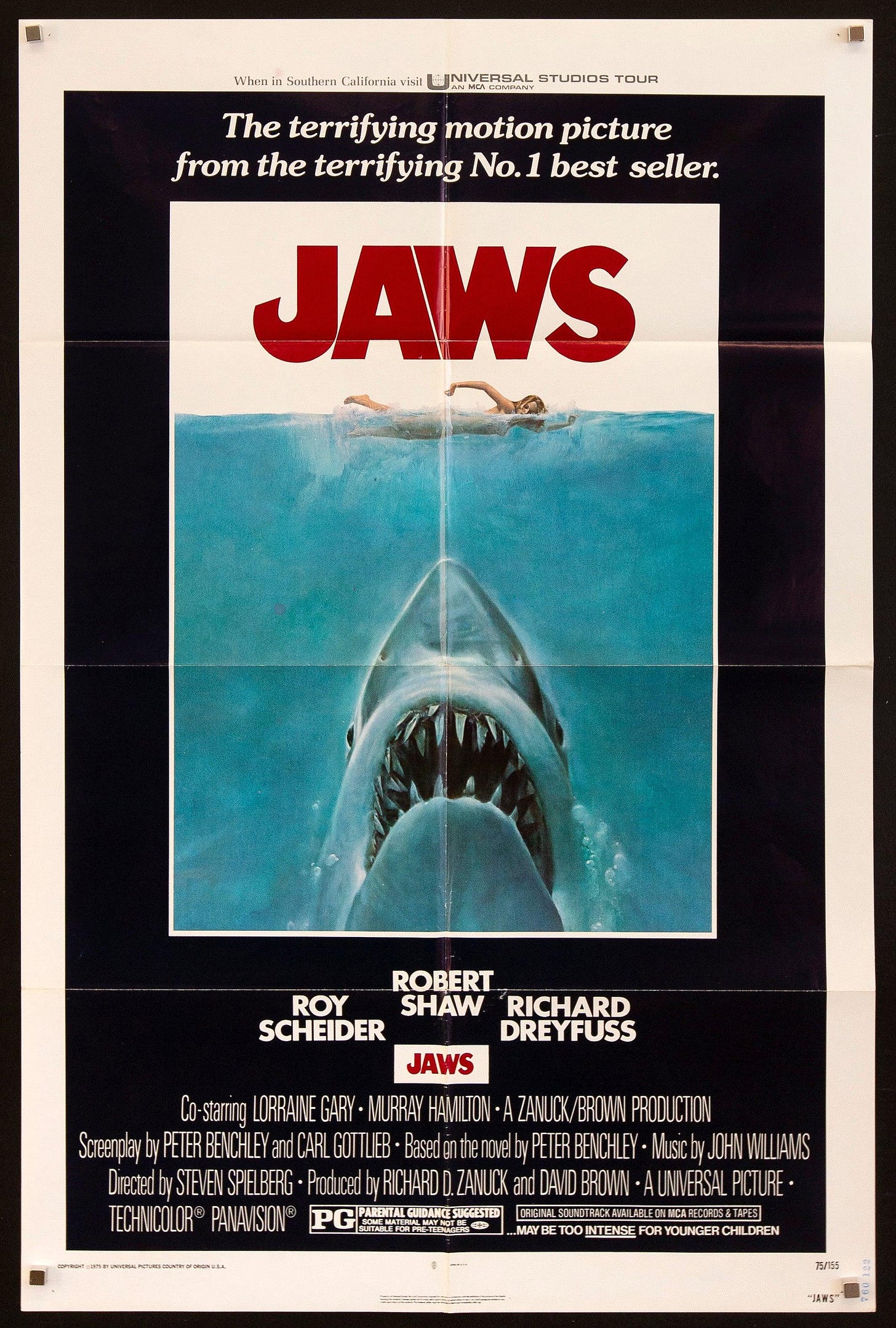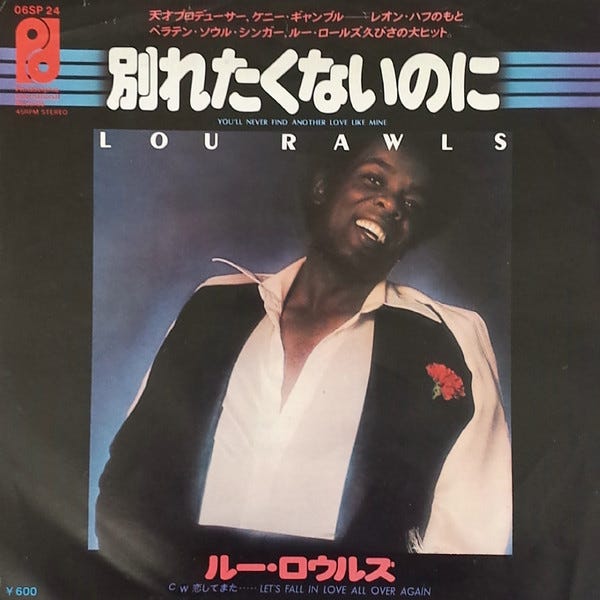I'm Not Braggin' on Myself, Baby
Lou Rawls — "You'll Never Find Another Love Like Mine" (1976)
The summer of 1976 was when I really started caring about what was on the radio, not coincidentally because it was also the first summer my sister and I spent traveling around Los Angeles in my mom’s car.
During our two previous summers in LA, we’d taken the bus everywhere, which was no big deal and actually kind of fun — it was a great way to get a sense of the city, or at least the stretch from Mid-Wilshire to the ocean, and a window seat on the RTD gave me the perfect vantage point for scoping out passing cars. I was pretty obsessed with vintage automobiles, and it wasn’t unusual in those days to spy pre-WWII vehicles cruising along Santa Monica and Wilshire boulevards, especially when riding through Beverly Hills. “Cars last much longer in places where there’s no snow,” my mom explained to me.
By 1976, she’d acquired a car of her own — nothing fancy or vintage, just a trusty Toyota Corolla two-door sedan with an AM radio that always seemed tuned to KIIS, a station which had the top pop hits in constant rotation, and which broadcast Casey Kasem’s American Top 40 every Sunday morning from 9 a.m. to noon. And as that summer went along, I started becoming a lot less interested in the cars I saw alongside of us, and a lot more interested in the sounds coming out of the Corolla’s speakers.
It was a great summer to be a nascent pop fan: Wild Cherry’s “Play That Funky Music,” The Bee Gees’ “You Should Be Dancing,” Johnny Taylor’s “Disco Lady,” Wings’ “Silly Love Songs” and “Let ‘Em In,” Walter Murphy and the Big Apple Band’s “A Fifth of Beethoven,” and KC and the Sunshine Band’s “(Shake Shake Shake) Shake Your Booty” were just few of the tracks bursting out of the car radio and inviting me to join the party. Even as my sister and I grew increasingly annoyed by the omnipresence of Elton John & Kiki Dee’s “Don’t Go Breaking My Heart” (which stayed at Number One on Casey’s countdown for the entire month of August), we couldn’t help singing along with it.
But the song that really got under my skin that summer sounded nothing like the above hits. It had sweeping strings, a Latin-sounding groove, and baritone vocals from an older-sounding guy that dripped with honeyed warmth and maybe also a hint of menace. “YOOOOOU’LL never FIIIIND,” he intoned in a voice as deep and lugubrious as a La Brea tar pit, as a piano echoed and underlined his words. It sounded slick and cool and extremely “grown-up,” and immediately grabbed my attention every time it aired. It was the first Lou Rawls song I ever heard.
As I would learn much later, “You’ll Never Find Another Love Like Mine” — which eventually made it to #2 on the Billboard Hot 100, while topping both the R&B and Easy Listening charts — was the first Lou Rawls song a lot of folks had heard in a while. For while he’d had a steady run of chart success from 1966 to 1971, a period in which he’d also won a couple of Grammys, performed at the 1967 Monterey Pop Festival, and co-hosted The Dean Martin Show, Lou’s career had since stalled out due to some questionable managerial decisions and record company cluelessness.
“A Natural Man,” his soulful first single for MGM after leaving his longtime home of Capitol Records, had reached both the pop and R&B Top 20s in 1971, but Lou’s new label apparently (and bizarrely) wanted the thirty-something gent to concentrate on material with pre-teen appeal. “The Osmonds were doing really well for MGM then, and MGM figured I could do well singing that same kind of music,” he told the Los Angeles Times in 1976. “No way, baby. I started my career singing jazz and blues and I got to be a respected entertainer. I wasn’t going to stoop to being a bubblegum machine.”
After escaping from MGM, Lou landed at Bell Records, a label that had enjoyed numerous hits in the late ‘60s and early ‘70s — largely via the practice of licensing singles from small US independent labels and UK labels that lacked solid North American distribution — but was practically running on empty by the time Lou showed up. He cut an absolutely killer version of Hall and Oates’ “She’s Gone” for the label in 1974, but Capitol Records muscled an inferior rendition by Tavares all the way to the top of the R&B charts, leaving Lou’s in the dust.
Thankfully, fate stepped in, in the funky form of Kenny Gamble and Leon Huff. The partners behind Philadelphia International Records felt they needed a voice like Lou’s on their roster, and signed him to a contract. All Things In Time, his first album for the label, was seen in the PIR offices as an all-hands-on-deck reclamation project; the company’s mission was to put Lou back on the charts. Songwriters Bunny Sigler, Bobby Martin, Jack Faith and Allan Felder all contributed to the album, but Gamble and Huff took it upon themselves to pen four of the LP’s nine songs. “You’ll Never Find…” was one of them, and it was released in June 1976 as the album’s lead single.
Charles Collins, who played drums on the “You’ll Never Find…” session at Philly’s legendary Sigma Sound Studios, recalled in John A. Jackson’s A House on Fire: The Rise and Fall of Philadelphia Soul that it was his own decision to give the song “an island-like feel” by playing a Caribbean-influnced groove on the rims during the verses, before switching over to the classic TSOP hi-hat groove on the chorus. He also remembered, “When we got called to do that date, the movie Jaws had just been released and it seemed as if every musician at Sigma Sound that day had seen it. [The movie] freaked everybody out. Everybody had a story about it. We spent an hour talkin’ about Jaws, and then we just grooved right into ‘You’ll Never Find Another Love Like Mine.’”
Which is a great story, but one I must unfortunately call bullshit on. Jaws was released in June 1975, and the recording of All Things in Time didn’t begin until November of that year. So unless the Philly Int’l session guys all just happened to see Jaws for the first time at a second- or third-run neighborhood theater months after its extremely high-profile release — or Gamble and Huff wrote the song and recorded its backing track before Lou even came into the picture — the timeline doesn’t check out. Still, I love the idea of the biggest film phenomenon of the summer of ‘75 somehow imprinting one of the biggest soul hits of the summer of ‘76.
In any case, Lou put a truly transcendent vocal over the top of the track, suavely daring the special lady in his life to go ahead and walk right out of it. “Oh, I’m not bragging on myself, baby,” he sings with an audible grin, because that’s absolutely what he’s doing; he knows right down to his cream-colored Italian loafers that somehow, some day, some way she’ll find herself missing his loving, since no one on God’s green earth can deliver “the rhythm, the rhyme” quite like Lou Rawls.
“You always got more than you gave [with Lou],” engineer Joe Tarsia told Jackson, raving about the singer’s “fat voice” and how “the piano parts and everything else just fell in so perfectly” on the session. Though never one to toot his own horn, Tarsia — who engineered countless brilliant tracks at Sigma Sound during Philly Soul’s 1968-78 heyday — was surely the man responsible for the track’s spacious elegance. Nobody knew how to balance tones and textures like that guy, and it had to have been his expert touch that really gave “You’ll Never Find…” its sophisticated sheen.
I’ve often said that if I could pick one song to live inside of, it would be “You’ll Never Find…”, and that’s precisely because everything about the record absolutely radiates ‘70s-style classiness; for me, hearing it always conjures up images of white shag carpets, clear lucite staircases, smoked-glass cocktail tumblers, tufted leather booths and electric fire pits. My mom, sister and I spent a lot of time in hotel lounges in the summer of 1976; the revolving restaurant at the top of the Bonaventure Hotel was a favorite afternoon hang, and we met up with several of her out-of-town friends at hotels in Beverly Hills and Century City. And while I don’t think I ever heard “You’ll Never Find…” on any of those occasions, the song always takes me right back to those places — maybe because I can’t think of another song from that summer that would have sounded more perfect in those settings. Pass the Chex mix, please…
“You’ll Never Find Another Love Like Mine” fully rejuvenated Lou’s career. He followed it with three straight classics that were cut from a similarly smooth-yet-funky cloth — “Groovy People,” “See You When I Get There” and “Lady Love” — and his comeback success helped to considerably boost his profile as a spokesperson for Budweiser, a gig which I wrote about at length here. And it eventually led to me becoming a huge Lou Rawls fan, even if I’ve never found another Lou song I love as much as this one. Sing it, baby…








Thanks for that trip down memory lane. 1976 was a big year for me. Starting with the bicentennial celebration in Boston. I got out of the Navy and got married in 1976!!These songs are burned into my memory. I do like Lou Rawls a lot. The songs he did with Sam Cooke are really cool. Gotta love that Philly sound. Thanks again for your contribution.
Lougubrious indeed!